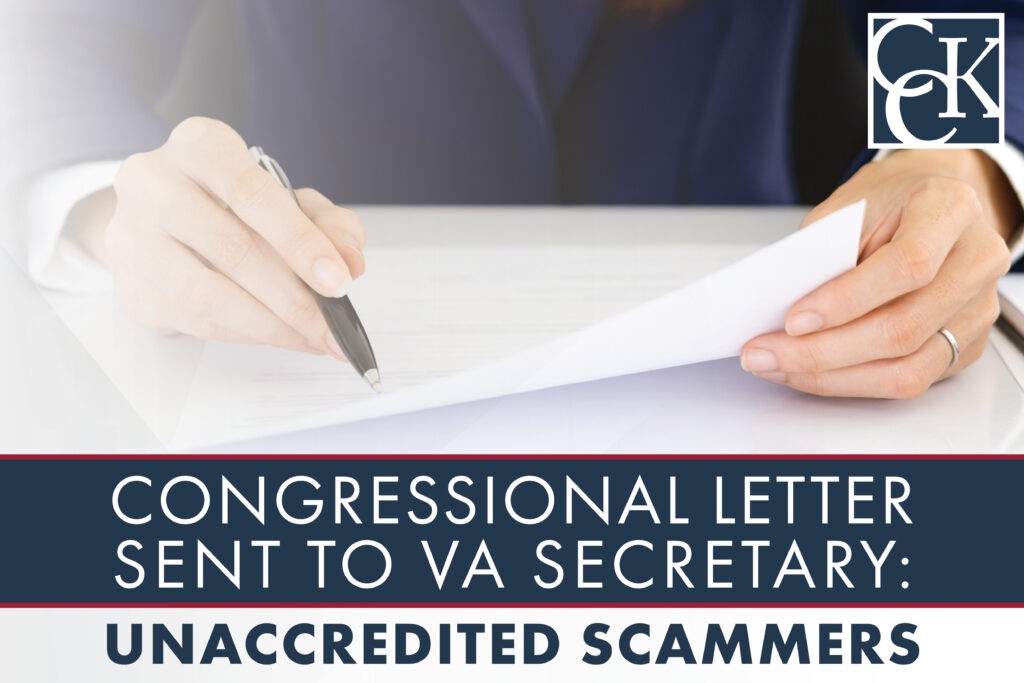Congressional Letter Sent to VA Secretary: Unaccredited Scammers

CCK Law: Our Vital Role in Veterans Law
On September 14, 2023, a group of US Senators wrote a letter to VA Secretary McDonough addressing protections for veterans against dealing with unaccredited claims consultants, or as the letter refers to them “predatory, quasi-legal claims consultants.”
Why Did Senators Send a Letter to VA Secretary McDonough?
The letter was sent by a group of senators with the aim of inquiring into the existing protections VA has for veterans seeking assistance filing initial claims for VA benefits and what resources would be necessary to enhance protections at the federal level.
Specifically, the letter conveys concerns that the passage of the PACT Act in 2022 has exposed veterans to unaccredited and unqualified individuals who seek to profit off veterans and their benefits.
How Has the PACT Act Increased the Effects of Unaccredited Scammers?
In April 2023, the FTC testified during a Senate Veterans’ Affairs Committee hearing on Veteran Consumer Protection: Preventing Financial Exploitation of Veterans and their Benefits.

During this testimony, the FTC reported that there were more than 150,000 complaints of fraud and illegal business practices relating to veterans and their benefits in 2022, resulting in over $414 million in damages. This was an increase of more than 50 percent from the prior year.
The increase in complaints last year could be related to the passage of the PACT ACT and unaccredited individuals using veterans who may be entitled to benefits under the PACT ACT as a source of profit.
VA has testified that between 2018-2022, more than 40 percent of all complaints received from veterans were against unaccredited individuals.
What Concerns Are There for Veterans?
One of the main concerns of the letter is the limited, or lack of, protections for veterans against these unaccredited individuals.
During an April 2022 Senate Veterans’ Affairs Committee hearing and a House Veterans’ Affairs Committee hearing on Ensuring Quality Representation in the Veteran’s Benefits Claims Process, VA testified that it has oversight over non-accredited individuals assisting with claims but lacks enforcement authorities to protect veterans.
Recently, VA has asked to reinstate criminal penalties for those who represent veterans with claims without being accredited. The senators who wrote this letter are also those who co-sponsored the Governing Unaccredited Representatives Defrauding (GUARD) VA Benefits Act. The letter notes that efforts to reinstate criminal penalties have stalled in the last three Congressional sessions.
What Can VA Do About Unaccredited Scammers?
As of right now, VA reports that the only redress against unaccredited scammers is to send a cease-and-desist letter to the unaccredited individual or unaccredited company, informing them that they are in non-compliance with VA statutes, specifically in violation of section 5301 of title 38. Additionally, these cases can be referred to state law enforcement.

The Senators’ letter to VA specifically calls into question what can be done, short of reinstating criminal penalties, to protect veterans and keep unaccredited individuals from taking benefits from veterans.
What Are the Senators Calling on VA to Do?
The Senators who sent this letter are giving VA a deadline of October 30, 2023, to respond to the following inquiries:
- What is VA’s official position on contracts in which a veteran agrees to pay a product of the increase in future benefits?
- If the above contracts are a violation of the assignment of benefits under section 5301 of title 38, what if any remedy or enforcement is there? Is it limited to civil enforcement by the veteran?
- If VA believes these contracts are a violation of assignment of benefits, why is VA not enforcing that law on existing contracts?
- Has VA ever sent a cease-and-desist letter to an individual or company for assignment of benefits in a contract?
- Without reinstating criminal penalties for violating VA’s accreditation scheme, what else can VA do aside from sending a cease-and-desist letter and or referring it to a state law enforcement agency?
- Is there anything VA can do without further legislation to enforce its accreditation?
- What is VA’s definition of preparation, presentation, and prosecution of claims?
- At what point does third-party medical evidence become the preparation of a claim?
- Do medical providers need to become accredited if they are assisting with medical evidence as part of an initial claim?
- What consequences does VA see if Congress authorizes accreditation for assistance with initial claims?
- Does VA believe the above consequences outweigh continuing without criminal penalties?
- How many letters has VA sent to unaccredited individuals and companies in 2023?
- Have any of those letters resulted in the ending of an illegal practice?
- What resources, short of reinstatement of penalties, does VA need to prevent unaccredited individuals from contracting with veterans?
Using this information, the Senators aim to work with VA on “solutions to help protect veterans and keep their hard-earned benefits where they belong.”
Which Senators Signed the Letter?
The following 31 Senators signed the letter:
- Jon Tester
- John Boozman
- Richard Blumenthal
- Lindsey O. Graham
- Chris Pappas
- Brian Fitzpatrick
- Mark Takano
- Angus King
- John Fetterman
- Jacky Rosen
- Andre Carson
- Sheldon Whitehouse
- Ruben Gallego
- Michael F. Bennet
- Peter Welch
- Sherrod Brown
- Jeanna Shaheen
- Debbie Dingell
- John Hickenlooper
- Jack Reed
- James E. Risch
- Mike Crapo
- Zoe Lofgren
- Ron Wyden
- Mark Kelly
- Lucy McBath
- Ben Ray Lujen
- Bernard Sanders
- Elizabeth Warren
- Mike Braun
- Margaret Wood Hassan
About the Author
Share this Post
